See the NHF Camp Directory.
Daniel Birgy didn’t want to go to camp. The doctors and nurses at his hemophilia treatment center (HTC) had recommended a camp for kids with bleeding disorders, but he really wanted to stay home with his mom. He’ll admit it: At 8 years old, he was a little scared.
Fast-forward 10 years, and you can’t keep Birgy away from Camp Bold Eagle in Holton, Michigan. The timid kid has grown into an 18-year-old leader who looks after his own group of young campers as a counselor, roughs it on rustic camping trips with fellow teens and has even been on a whitewater rafting adventure.
Birgy, who lives in Mancelona, Michigan, and has severe hemophilia A, immediately recognized the sense of community on his first day at Camp Bold Eagle. Fears were quickly erased. “It was just amazing—actually fitting in for once,” he says.
Teens who have grown up at camp now work to give younger kids with bleeding disorders that same sense of belonging at locations around the country. Whether they’re training to be counselors, working with kids or striking out on adventures of their own, they get as much out of camp as they give back.
Campfire Tales
Some aspects of summer camp are universal: the smell of campfire on your clothes, sticky fingers from making s’mores, belly laughs at silly skits and heartfelt conversations with friends old and new.
At camp for kids with bleeding disorders, those conversations often go a little deeper. People who may clam up about their experiences at home or in school, where they fear no one will understand, will open up to peers who have been through the same struggles. They’ll talk about infusing for the first time, or the day a bad bleed kept them from playing outside with friends. Some share the feeling of being a little different from everyone else.
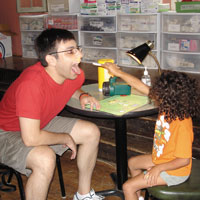
“That’s true even for the youngest campers who say, ‘Oh, that happened to me, too,’” says Jennifer Meador, co-director of Camp Ailihpomeh (“hemophilia” spelled backward), a collaborative program of Texas hemophilia treatment centers, the Lone Star Chapter of the National Hemophilia Foundation (NHF) and the Texas Central Hemophilia Association. “They open up and talk about things I doubt they talk about every day.” Sometimes a young camper talks one-on-one with a nurse or other medical staff member. Some nights bring impromptu campfire conversations. Other times groups share stories as part of an official educational program. Meador sees the benefits of such openness in teens as she participates in the camp’s award-winning leadership program.
During the teenage years, which are filled with physical and emotional changes, plus fears about popularity and fitting in, camp provides a place to drop the posturing. “Hemophilia summer camps are the one place where you can be real on all levels,” says Bobby Wiseman, manager of special projects at NHF. He co-directs Camp Hemotion, a joint program of the Hemophilia Foundation of Northern California and the Central California Hemophilia Foundation. “There are no barriers. There are no facades. If you’re having issues with something, someone there has gone through it and can help you.”
Wiseman, who has severe hemophilia B, knows this well. He’s been going to Camp Hemotion for 32 years, first as a camper, then as a junior counselor, assistant counselor, unit director and finally as co-director for the past six years. In his teenage years in the 1980s, camp provided a safe, comfortable refuge for him and for friends to talk about issues related to HIV.
Today, teens’ concerns are not always so heavy, but they still need a supportive outlet for difficult conversations, says Anne Henningfeld, director of Camp Bold Eagle, a program of the Hemophilia Foundation of Michigan. Camp is the place where teens can talk about relationship issues and discuss health insurance, college and more. “Because of their camp experience, they’re willing to ask hard, important questions about their bleeding disorders and about becoming an adult,” Henningfeld says.
[Steps for Living: All About Summer Camps ]
Follow the Leader
Sarah Chan, 16, says that as hard as it is to ditch her modern conveniences such as her iPod and cell phone for a week, there are benefits, too. Going on her sixth summer at Camp Hemotion and her third year as a junior counselor (JC), Chan has learned that getting rid of all of those distractions for a while—a camp policy—leaves plenty of free time to get to know people on a much more personal level.
To Chan, a San Francisco resident with the platelet disorder Glanzmann’s thrombasthenia, that’s the beauty of being a junior counselor. At Camp Hemotion, JCs have responsibility for and some authority over the younger campers, but those campers also feel a more immediate connection to their JCs than they might to older staff members.
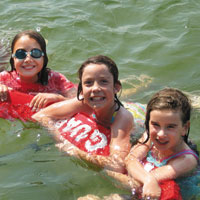 “When you’re a camper, you really connect with your junior counselors and your assistant counselors because they’re closer to your age,” Chan says. “You can ask questions like, ‘When you were my age and had your first period, what happened?’ A lot of younger girls are really apprehensive about that.”
“When you’re a camper, you really connect with your junior counselors and your assistant counselors because they’re closer to your age,” Chan says. “You can ask questions like, ‘When you were my age and had your first period, what happened?’ A lot of younger girls are really apprehensive about that.”
Even when she spends her days trying to herd a group of 6-year-old boys, Chan says knowing what kind of influence she has makes the effort worthwhile. “It’s really fun to have that kind of rewarding experience, to know that what you’re doing with them makes a difference,” she says.
Camp isn’t all deep conversation, though. Swimming, archery, horseback riding, field games, nature walks—those are all part of the camp experience, too. Surrounded by highly trained medical staff ready to help any time of the day or night, campers get to do things they may have only imagined before.
Beau Reinegger, 20, a boisterous, adventurous and sports-minded guy with severe hemophilia B, started going to Camp Hemotion when he was 5 years old. This summer will be the Coalinga, California, resident’s first as a full counselor. He thrills at the chance to help kids take that first step on a ropes course or grab that first hand-hold on a rock climbing wall.
Deep down, Reinegger says he’s just a big kid who still loves camp, with all of its silly songs and traditions. No wonder his campers relate to him so easily. His signature Mohawk has become an informal group project. “The kids are becoming great barbers,” he jokes.
Learning the Ropes
A fun-loving attitude and enthusiasm are prerequisites for being a camp counselor, but they’re not enough. Camps for children with bleeding disorders offer training programs for people to work their way from camper to leader.
At Camp Ailihpomeh, teens 13–17 years old are eligible for the leadership program. They attend the same weeklong camp as the younger kids, but have their own special sessions on education, the transition to adulthood, and college and career planning, for example. They also arrive early to design orientation programs. Eventually, if they are inclined and qualified, they can become counselors in training (CIT).
“I always knew I would become a counselor in training,” says Dylan Hillard, 17. “It’s how you keep coming back to camp, and I always want to come back to camp.” Hillard, a Wichita Falls, Texas, resident with mild hemophilia A, looked up to the CITs and camp counselors when he was younger, whether he was trying to show them up in sports (he’s highly competitive) or just hanging out and learning camp traditions from them. Now, he understands the role of the counselor.
“You can’t go off and do your own thing,” he says. “You have to put the younger campers first.”
Val Bias, CEO of NHF and longtime co-director of Camp Hemotion, notes that being a junior counselor (ages 15–17) or assistant counselor (ages 18–20) is a job, complete with an application process. It’s not just fun and games or sleeping under the stars. The junior and assistant counselors are responsible for the kids in their cabins.
With that responsibility comes reward, though. “I think many of them are inspired by the impact they can have on their kids,” Bias says. “That inspires them to greater leadership in their own lives.” Bias 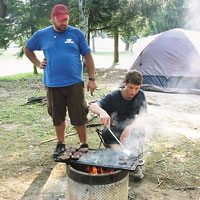 says that teens are taught how to project themselves to the campers they lead. They learn to plan ready-made activities and how to address behavioral issues.
says that teens are taught how to project themselves to the campers they lead. They learn to plan ready-made activities and how to address behavioral issues.
Similarly, Camp Bold Eagle’s CIT program starts at age 16; CITs prepare to take on leadership roles before and during the camp’s sessions. The camp also offers the Eagle Outpost for teens ages 14 and 15, who fall between the age cut-offs for the main camp and the CIT program. Eagle Outpost takes teens to more rustic campsites around Michigan.
The week often starts with typical teen behavior, says Sherry Hubble, Eagle Outpost’s camp health officer. She is a hemophilia nurse at Helen DeVos Children’s Hospital in Grand Rapids, Michigan. At first, campers stick to their cliques and pick on each other for having different haircuts or clothes. By the end of the week, though, they all act like a team, regardless of background, she says.
Eagle Outpost’s leadership approach facilitates team problem-solving. The staff lets the teens figure things out on their own as much as possible. In addition to low- and high-ropes courses and other team-building exercises, campers must set up and take down camp each day. They plan, budget and cook nightly meals that suit everyone’s needs, including food allergies and restrictions. Further, the teens work with Hubble and other medical staff members to plan treatment for the week, including recognizing when their medical needs mean they should opt out of an activity.
“It’s about showing them how to make good choices,” Hubble says. By taking on such big responsibilities, campers learn that they have to work together. Leaders emerge, as do other group roles.
“You’re in a group of people, and you grow to respect them,” Birgy says of his Outpost experience. “By the end of the week, it’s all friendliness. No matter what walk of life you’re from, you’re all one big family.”
Birgy also went on Eagle Expedition, a partner program with Camp Hemotion’s Disabled Adventure Outfitters (DAO) program. Each year, Henningfeld takes 13 campers ages 16 and up to California for a week of whitewater rafting, rock climbing and bonding, all with the underlying goal of boosting leadership. Some of the participants have never been on a plane or seen the ocean, so the trip opens their eyes to the larger world. DAO has run the same program for older Camp Hemotion campers since 1998.
“What’s essential about the adventure program is that it is just for them,” Bias says. “When you’re at camp looking after the younger kids, you have a different role. When you’re at a teen program, you’re the camper.” (Note: Whitewater rafting and rock climbing can be dangerous, so medical professionals take part in these trips. For more information on the safety of outdoor activities and sports, see NHF’s guide Playing It Safe: Bleeding Disorders, Sports and Exercise, available by e-mailing HANDI, NHF’s information resource center: [email protected] or calling 800.42.HANDI.)
The DAO adventure has been a highlight for older campers. Reinegger spent four weeks on the river last year, both as a participant and as an assistant for visiting groups. He has always liked to push boundaries and share his ideas of freedom with fellow campers, but whitewater rafting goes well beyond playing sports and camp games. To Reinegger, it’s the ultimate form of overcoming fear and the limitations faced by many people with bleeding disorders. “It’s a really big jump,” he says. “That’s freedom and a half right there.”
When Summer Ends
Camps instill a sense of community and commitment in the people who grow up attending them. Meador, Henningfeld and Wiseman speak of the strong retention rates at their camps. Campers come back year after year, as do volunteer counselors, regardless of distance. Wiseman’s longevity serves as an example of a life devoted to camp.
Reinegger’s commitment to camp shows—he has even changed jobs for ones that are more flexible about the chunk of time he needs each summer. “I told them that camp is the biggest thing in my life,” he says. “It’s done me well, so I’m not going to let it down now.”
The value extends way beyond a lifelong love of camp, Henningfeld says. Campers who learn independence, responsibility and a sense of community at a young age often grow up to be dedicated advocates and fundraisers in the bleeding disorders community. Others choose the medical field so they can devote their lives to bleeding disorders.
“It all starts at camp,” Henningfeld says.
[Steps for Living: Building Independence ]

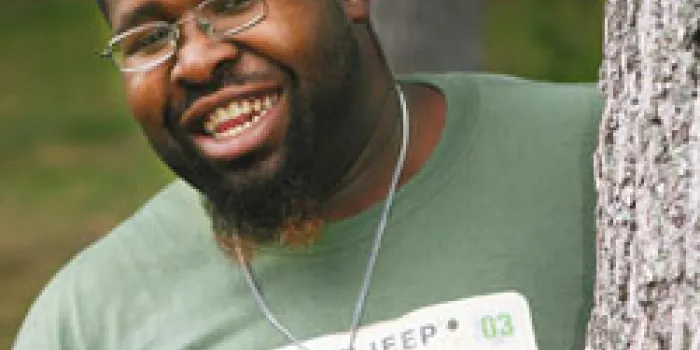
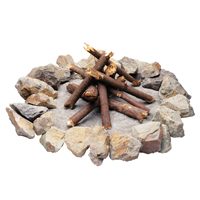 The
The